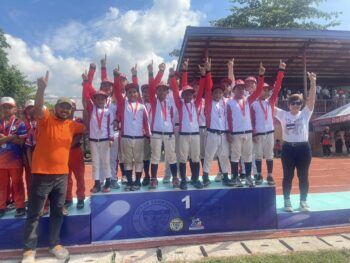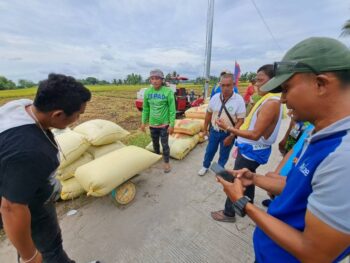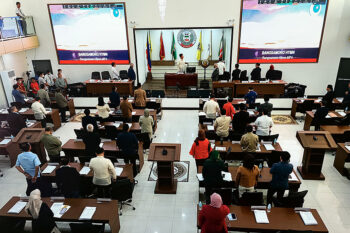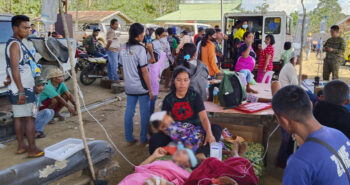MAKATI CITY (MindaNews /04 February) – One lazy afternoon, I received an email from a friend who shared a link and asked me if I’m interested to apply for a United Nations Development Program (UNDP)-sponsored short course on negotiation and mediation as an instrument of conflict resolution being regularly conducted by a think-tank in the Netherlands.
Naturally, I said resoundingly, “Yes!” So, as it was the deadline for submission of the application, I immediately filled up the online form for about an hour and then clicked “Submit”! I was then hopeful to be accepted, but not necessarily expecting.
Two weeks after, I received an email of my application’s acceptance with much jubilation. “Back to school again,” I told myself, “and this time, in The Hague-based Clingendael Institute.”
Literally means “a valley in the dunes” and located in a 17th century manor house surrounded by a large park, Clingendael, or the Netherlands Institute of International Relations, is a leading think-tank and diplomatic academy in the world, whose primary aim is to contribute to a secure, sustainable and just world.
As a result of fusion of five smaller institutes in January 1983, Clingendael is unique for its multifunctional character of regularly conducting a host of integrated training, research, and educational consultative activities under a single roof.
Since 2015 Clingendael has been partnering with the UNDP in its initiative since 2004 to support insider mediation capacity-building in about 40 countries, by providing mediation and negotiation trainings.
Attended by 20 participants from Afghanistan, Bangladesh, Ghana, Honduras, Indonesia, Lebanon, Libya, Malawi, Maldives, the Philippines, Sierra Leone, Thailand, and Venezuela, this fourth batch of “Negotiation and Mediation Training as an Instrument for Conflict Resolution for Insider Mediators” was a combination of interactive simulations to improve the participants’ skills and case studies to help them reflect on both the theory and practice of mediation.
In a bid to provide the trainees with an in-depth understanding of how negotiations work so as for them to effectively facilitate a negotiation as a mediator, the first week was primarily focused on negotiation training (discussions on negotiation theory, strategies and simulations), while the second week concentrated on mediation and the specific role and skills of insider mediators and their role within the UNDP framework, with particular emphasis on understanding modalities for inclusivity and ownership of the peace agenda.
The classroom training sessions were also ideally interspersed with an educational visit to the Permanent Court of Arbitration (PCA) at the Peace Palace in The Hague and to Von Gogh Museum in Amsterdam.
After our training session on stakeholders- and negotiators-mapping on the second week, I saw myself accompanying three fellow Southeast Asian trainees and the representative of an international non-government organization (NGO), in going to Utrecht by train to meet with Communist Party of the Philippines (CPP) founding chairman and National Democratic Front of the Philippines (NDFP) chief political consultant Jose Maria Sison, NDFP senior adviser Luis Jalandoni, NDFP Peace Panel Chairman Fidel Agcaoili, and NDFP Peace Panel member Connie Ledesma, in order to listen to their narratives and concerns on the stalled negotiations with the Philippine government.
The following day, three of us trainees from the Philippines were invited at the embassy by the Philippine ambassador to the Netherlands, His Excellency Mr. Jaime Victor B. Ledda, for a casual discussion on various issues including our two-week training and the peace process with the NDF.
Listening to the two narratives, I observed that each camp has identified its own ‘culprit’ of the stalled peace process: the Philippine government’s principal (Pres. Rodrigo Duterte), or the lack of enabling environment for the peace talk.
This personal observation inevitably calls to mind the concluding remark of our trainer on conflict analysis: “Conflict analysis, therefore, is not about the conflict per se; it is rather about you; it is about your perception of the conflict!” In other words, it is not about the story, but rather your narrative of the story.
Paradoxically, after almost two weeks of training on ‘insider mediation,’ our last trainer told us, “If you are an ‘insider mediator’ then you don’t exist!” As he clarified in the open forum, the reason for this claim is that every mediator is invariably a stakeholder in the conflict he or she is mediating and that mediating is becoming a lucrative business for some ‘mediators’.
In short, it is mediating ‘insider mediation’.
[MindaViews is the opinion section of MindaNews. Mansoor L. Limba, PhD in International Relations, is a writer, educator, blogger, chess trainer, and translator (from Persian into English and Filipino) with tens of written and translation works to his credit on such subjects as international politics, history, political philosophy, intra-faith and interfaith relations, cultural heritage, Islamic finance, jurisprudence (fiqh), theology (‘ilm al-kalam), Qur’anic sciences and exegesis (tafsir), hadith, ethics, and mysticism. He can be reached at mlimba@diplomats.com, or http://www.mlimba.com and http://www.muslimandmoney.com.]







